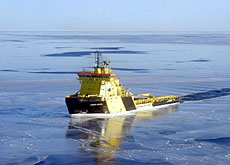Polar research comes in from the cold

Switzerland has finally become a full member of the international Scientific Committee on Antarctic Research (SCAR), after 20 years of regular polar studies.
Polar experts hope the move, finalised on Monday, could pave the way for Switzerland to maintain a permanent presence at the South Pole.
“It’s about time,” said Christian Schlüchter, a geologist who represents Switzerland at the SCAR.
“Full membership is an important step, since Swiss scientists can now lead international research projects in Antarctica.”
Admission to the international body has been welcomed by the Swiss Committee on Polar Research (SCPR), which has overseen the country’s development as a world leader on climate studies.
Ice cores
Ice cores collected in polar regions have proved to be reliable records of climate change over the centuries. Gas samples trapped in the ice give the precise composition of the atmosphere at a certain date.
Researchers at Bern University have made a name for themselves decrypting this information, developing methods that have allowed them to draw data from the smallest samples.
They have also designed and built drill heads for boring deep into the ice cap. These bits were used on the last big core project in Antarctica, which lasted eight years.
Scientists drilled three kilometres down into the ice cap to collect ice samples from the past 740,000 years.
They found that there were eight ice ages during that period, separated by spells of global warming when the atmosphere contained as much carbon dioxide as it does today.
Collection of the ice samples was carried out in inhospitable conditions, with temperatures dropping as low as minus 40 degrees Celsius. But Swiss scientists say they want to go back and drill even deeper.
“We need to go back in time to understand today’s and tomorrow’s climate,” said Bernard Stauffer, a former professor at Bern University. Stauffer was among the first to analyse gas sealed in the ice.
Shrinking ice cap
Studies at Zurich’s Federal Institute of Technology have shown that the short-term outlook is for ice caps to keep on shrinking, which is likely to affect coastal populations.
“Villages in the Arctic region are built close to water,” Swiss ethnologist Yvon Csonka told swissinfo. “If the sea remains ice-free for longer periods, the shoreline is less protected and erodes faster, putting the villagers’ homes at risk.”
Csonka, who is a professor of social and cultural history in Greenland, says that villages on the island have already begun to suffer from this problem.
The ethnologist is a former member of the SCPR, and an example, say its members, of its multidisciplinary approach which looks beyond climatology.
Its president, Bruno Gottstein, is a specialist on parasites who has studied tapeworm in polar regions. His predecessor was an economist, while the committee’s founder, Lucius Caflisch, was a legal expert.
Antarctic Treaty
Caflisch, who worked for the Swiss foreign ministry, has a special interest in the Antarctic Treaty.
Nine nations have staked claims around the South Pole. But the issue of territory was set aside when they agreed that political and legal differences should not interfere with research in Antarctica.
“It was rather unique that different countries were prepared to discuss collaboration without settling territorial claims,” he told swissinfo.
Switzerland is only a signatory to the treaty, which it joined in 1990. The majority of the 44 states that have signed the accord are consultative parties, meaning they maintain a presence in Antarctica.
Caflisch hopes this will be the next step for the Swiss.
“That could be a goal for the Swiss Committee on Polar Research,” he added.
swissinfo, Antoinette Schwab
The Swiss Committee on Polar Research was founded 20 years ago.
It is a multidisciplinary body that promotes Swiss research in polar regions.
The Committee represents Switzerland in international organisations and coordinates research projects.
Switzerland will now be a full member of the Scientific Committee on Antarctic Research.

In compliance with the JTI standards
More: SWI swissinfo.ch certified by the Journalism Trust Initiative










You can find an overview of ongoing debates with our journalists here . Please join us!
If you want to start a conversation about a topic raised in this article or want to report factual errors, email us at english@swissinfo.ch.